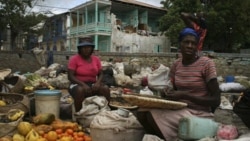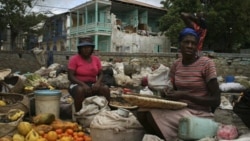Investing in advancing the rights of women, including the prevention and response to gender-based violence, is a cornerstone of the Obama Administration's commitment to gender equality and women's empowerment globally.
Gender-based violence undermines not only the safety, dignity, and human rights of those women and girls who experience it, but it also has dire consequences for public health systems, economic stability, and the security of all nations.
According to the World Bank, “gender-based violence severely limits women's contributions to social and economic development. Gender-based violence is also a major cause of ill health among women and girls, an impediment to the accumulation of human capital, and a major factor in the inter-generational transmission of violence from parents to children.”
The United States is especially concerned about the Caribbean region, said Anita Botti, chief of staff and deputy director of the Department of State’s Office of Global Women’s Issues. “According to the United Nations Office on Drugs and Crime, every one of the Caribbean islands has a sexual violence rate that is higher than the world average,” she said.
In an effort to give new impetus to existing programs, and to bring attention to the devastating effects of this scourge, the Department of State in partnership with Florida International University in Miami, or FIU, hosted in mid-December the Caribbean Dialogue on Rule of Law and Gender-Based Violence.
Government, law enforcement, judicial officials, prosecutors and civil society from 12 Caribbean nations convened at FIU to exchange ideas and share strategies for strengthening the rule of law and ending gender-based violence in their countries.
“The Dialogue gave participants an opportunity to deepen their understanding of how violence against women and girls affects all sectors of society, the cost of GBV in the work place, its linkage to HIV-AIDS, and the importance of the role of men and boys in preventing this type of violence,” said Ms. Botti.
“Violence against women affects all of society, and only by working together can we ever hope to put an end to this scourge.”
Gender-based violence undermines not only the safety, dignity, and human rights of those women and girls who experience it, but it also has dire consequences for public health systems, economic stability, and the security of all nations.
According to the World Bank, “gender-based violence severely limits women's contributions to social and economic development. Gender-based violence is also a major cause of ill health among women and girls, an impediment to the accumulation of human capital, and a major factor in the inter-generational transmission of violence from parents to children.”
The United States is especially concerned about the Caribbean region, said Anita Botti, chief of staff and deputy director of the Department of State’s Office of Global Women’s Issues. “According to the United Nations Office on Drugs and Crime, every one of the Caribbean islands has a sexual violence rate that is higher than the world average,” she said.
In an effort to give new impetus to existing programs, and to bring attention to the devastating effects of this scourge, the Department of State in partnership with Florida International University in Miami, or FIU, hosted in mid-December the Caribbean Dialogue on Rule of Law and Gender-Based Violence.
Government, law enforcement, judicial officials, prosecutors and civil society from 12 Caribbean nations convened at FIU to exchange ideas and share strategies for strengthening the rule of law and ending gender-based violence in their countries.
“The Dialogue gave participants an opportunity to deepen their understanding of how violence against women and girls affects all sectors of society, the cost of GBV in the work place, its linkage to HIV-AIDS, and the importance of the role of men and boys in preventing this type of violence,” said Ms. Botti.
“Violence against women affects all of society, and only by working together can we ever hope to put an end to this scourge.”






